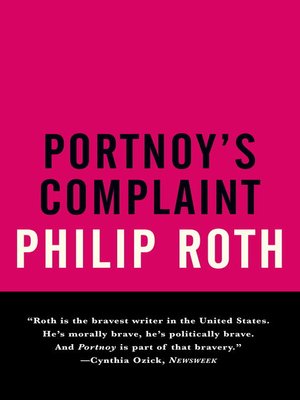

The genius of Philip Roth is that each and every book became a conversation. And now, we are told, the real conversation must start. Yes?” This whole time Portnoy had been on his shrink’s couch. The punchline? “Now vee may perhaps to begin.

After 289 pages of crowing and kvetching, the never satisfied Alexander Portnoy utters a primal scream and collapses. But the key line, I think, is the last one. Most readers of this book likely remember the indelible scenes of masturbation and sexual hijinks (the liver lobby never recovered from one famous scene).

There may be no freer book in American Jewish literature - or perhaps even in American literature - than “Portnoy’s Complaint,” Roth’s 1969 comic zeitgeist-buster which brought to a close a decade of social conflict and individual freedom-mongering. By pushing against the bonds of communal expectation, Roth clarified how intricate and powerful they actually were. For Roth, this experience was essentially about the promise and peril of freedom - sexual, social, religious, intellectual and familial. In a career that spanned more than 50 years, the novelist Philip Roth - who died on Tuesday at age 85 - hit virtually all of these notes, writing in a jet-fueled prose that carried the reader into the manic heart of the American/Jewish experience. Jews were often the first to fall through those cracks, and so Jews - as well as Jewish writing - had to ask sharper and deeper questions than their neighbors. A few weeks ago, I spoke to some undergraduates about what makes writing “Jewish.” What qualities or characteristics might identify a fictional text, or a real writer, as Jewish? We talked about Jewish content and rituals about the pressure of language, and the addiction of commentary of passing, and passing through borders of humor and prophecy emerging in response to the black ice of historical experience and of the intense quality of Jewish conversation - some might even call it interrogation - developed and modulated to hear and then analyze the subterranean rumblings that constantly threatened to fracture the body politic and social.


 0 kommentar(er)
0 kommentar(er)
